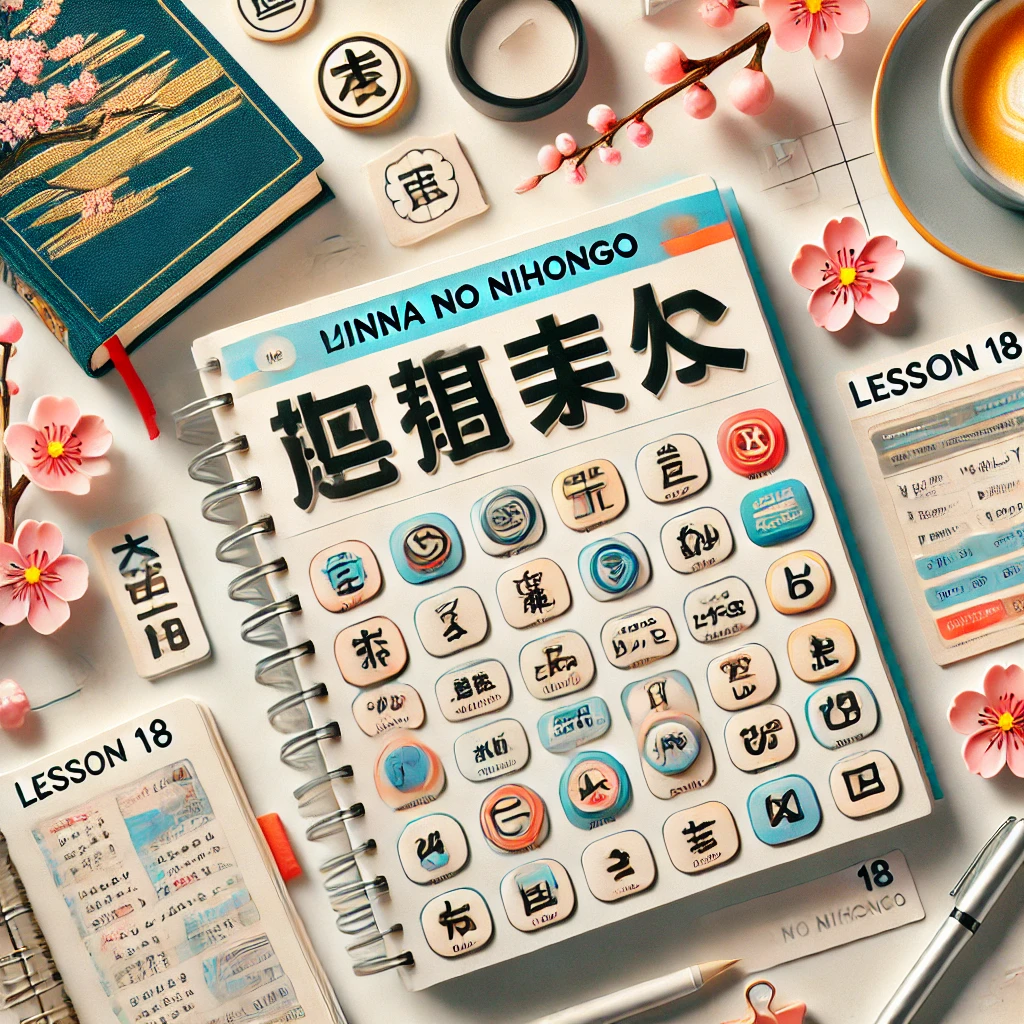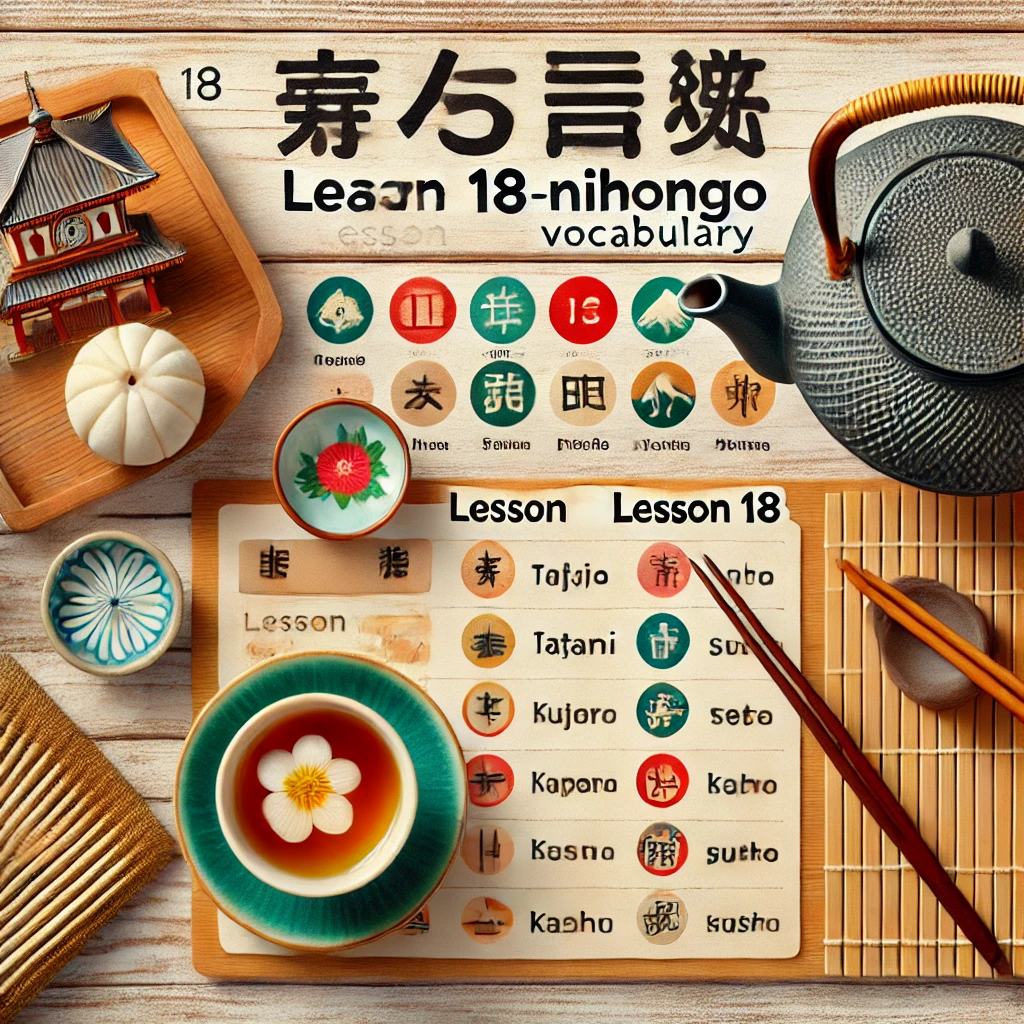Are you interested in reading Minna No Nihongo Lesson 18 vocabulary and grammar? If you are, you are in the right place.
Minna No Nihongo is one of the most popular textbooks for learning Japanese. In Lesson 18, we explore essential vocabulary related to actions and states of being. Whether you’re preparing for the JLPT N5 or just starting your Japanese journey, mastering these words will boost your confidence in communication.
Minna no Nihongo Lesson 18 Vocabulary Practice
| Japanese | English | Indonesian | Vietnamese | |
|---|---|---|---|---|
| 切る (きる) | to cut | memotong | cắt | |
| 足りる (たりる) | to be enough, to be sufficient | cukup | đủ | |
| 使う (つかう) | to use | menggunakan | sử dụng | |
| 作る (つくる) | to make, to create | membuat | tạo ra | |
| 持つ (もつ) | to hold, to have | memegang | có, giữ | |
| 取る (とる) | to take | mengambil | lấy | |
| 調べる (しらべる) | to investigate, to check | memeriksa | kiểm tra | |
| 教える (おしえる) | to teach | mengajar | dạy | |
| 習う (ならう) | to learn (from someone) | belajar | học | |
| 借りる (かりる) | to borrow | meminjam | mượn | |
| 貸す (かす) | to lend | meminjamkan | cho mượn | |
| 送る (おくる) | to send | mengirim | gửi | |
| 貸し出す (かしだす) | to lend (something) | meminjamkan | cho mượn | |
| 帰る (かえる) | to return, to go back | kembali | trở về | |
| 遊ぶ (あそぶ) | to play, to enjoy oneself | bermain | chơi | |
| 見学する (けんがくする) | to visit, to tour (for study) | mengunjungi | tham quan | |
| 走る (はしる) | to run | berlari | chạy | |
| 泳ぐ (およぐ) | to swim | berenang | bơi | |
| 読む (よむ) | to read | membaca | đọc | |
| 書く (かく) | to write | menulis | viết | |
| 食べる (たべる) | to eat | makan | ăn | |
| 見る (みる) | to see, to look | melihat | xem | |
| 聞く (きく) | to listen, to ask | mendengar, bertanya | nghe, hỏi | |
| 話す (はなす) | to speak, to talk | berbicara | nói | |
| 買う (かう) | to buy | membeli | mua | |
| 売る (うる) | to sell | menjual | bán | |
| 寝る (ねる) | to sleep | tidur | ngủ | |
| 起きる (おきる) | to wake up | bangun | thức dậy | |
| 勉強する (べんきょうする) | to study | belajar | học | |
| 旅行する (りょこうする) | to travel | bepergian | du lịch | |
| 遊園地 (ゆうえんち) | amusement park | taman hiburan | công viên giải trí | |
| 映画館 (えいがかん) | movie theater | bioskop | rạp chiếu phim |

Additional Vocabulary for Better Conversation Skills:
| Japanese | English | Indonesian | Vietnamese | |
|---|---|---|---|---|
| 元気 (げんき) | healthy, energetic | sehat, energik | khỏe mạnh, năng động | |
| すごい | amazing, great | luar biasa | tuyệt vời | |
| 大丈夫 (だいじょうぶ) | okay, alright | tidak apa-apa | ổn | |
| 本当に (ほんとうに) | really, truly | benar-benar | thật sự | |
| ありがとう | thank you | terima kasih | cảm ơn | |
| すみません | excuse me, sorry | permisi, maaf | xin lỗi | |
| こんにちは | hello, good afternoon | halo, selamat sore | xin chào, chào buổi chiều | |
| お疲れ様 (おつかれさま) | good job, thank you for your hard work | terima kasih, kerja bagus | cảm ơn, làm việc tốt | |
| どうぞ | please, go ahead | silakan | làm ơn | |
| 何ですか (なんですか) | What is it? | apa itu? | cái gì? | |
| いくら | how much? | berapa | bao nhiêu |
Grammar Notes from Lesson 18
Root Verb (るけい) Examples and Usage
- たべる (to eat)
- Plain Form: たべる
- Polite Form: たべます
- Example 1:
- Plain: ごはんをたべるのが好きです。
(I like eating rice.) - Polite: ごはんをたべますのが好きです。
- Plain: ごはんをたべるのが好きです。
- みる (to see/watch)
- Plain Form: みる
- Polite Form: みます
- Example 2:
- Plain: 映画をみる時間がありません。
(I don’t have time to watch a movie.) - Polite: 映画をみます時間がありません。
- Plain: 映画をみる時間がありません。
- ねる (to sleep)
- Plain Form: ねる
- Polite Form: ねます
- Example 3:
- Plain: 毎日、11時にねるようにしています。
(I try to sleep at 11 o’clock every day.) - Polite: 毎日、11時にねますようにしています。
- Plain: 毎日、11時にねるようにしています。
- あける (to open)
- Plain Form: あける
- Polite Form: あけます
- Example 4:
- Plain: ドアをあけると、外が寒かったです。
(When I opened the door, it was cold outside.) - Polite: ドアをあけますと、外が寒かったです。
- Plain: ドアをあけると、外が寒かったです。
- かりる (to borrow)
- Plain Form: かりる
- Polite Form: かります
- Example 5:
- Plain: 友だちに本をかりる予定です。
(I plan to borrow a book from my friend.) - Polite: 友だちに本をかります予定です。
- Plain: 友だちに本をかりる予定です。

Supporting Grammar
- ~のが好きです (I like doing ~)
- Example: 本を読むのが好きです。
(I like reading books.)
- Example: 本を読むのが好きです。
- ~時間がありません (I don’t have time to do ~)
- Example: 宿題をする時間がありません。
(I don’t have time to do my homework.)
- Example: 宿題をする時間がありません。
- ~ようにしています (I try to do ~ regularly)
- Example: 毎日、運動するようにしています。
(I try to exercise every day.)
- Example: 毎日、運動するようにしています。
- ~と (when/if ~)
- Example: 朝、コーヒーを飲むと元気になります。
(When I drink coffee in the morning, I feel energized.)
- Example: 朝、コーヒーを飲むと元気になります。
- ~予定です (I plan to do ~)
- Example: 明日、映画を見に行く予定です。
(I plan to go see a movie tomorrow.)
- Example: 明日、映画を見に行く予定です。
1. 〜ために (ために) (For)
| Japanese | English | Nepali | Indonesian | Vietnamese |
|---|---|---|---|---|
| 〜ために | In order to | untuk | để |
Explanation:
- Used to indicate purpose or goal.
- It attaches to a verb in its dictionary form to express the reason for doing something.
Example:
- 日本語を勉強するために日本に来ました。
(I came to Japan to study Japanese.) - 私は健康のために運動しています。
(I exercise for the sake of my health.)
2. 〜んです (〜のです)
| Japanese | English | Indonesian | Vietnamese | |
|---|---|---|---|---|
| 〜んです | It is that… | itu karena… | là vì… |
Explanation:
- Used to give an explanation or reason for something.
- The sentence can be used in both casual and formal situations.
Example:
- 今日は行けないんです。
(I can’t go today because of [a certain reason].) - 何か質問があるんですか?
(Do you have any questions?)
3. 〜てもいいですか
| Japanese | English | Indonesian | Vietnamese | |
|---|---|---|---|---|
| 〜てもいいですか | Is it okay to…? | Bolehkah…? | Có được… không? |
Explanation:
- I used to ask for permission to do something.
Example:
- このペンを使ってもいいですか?
(Is it okay if I use this pen?) - ここに座ってもいいですか?
(Is it okay to sit here?)
4. 〜なくてもいいですか
| Japanese | English | Indonesian | Vietnamese | |
|---|---|---|---|---|
| 〜なくてもいいですか | Is it okay not to…? | Apakah tidak perlu…? | Có được không nếu không…? |
Explanation:
- Used to ask if it’s okay not to do something.
Example:
- この仕事をしなくてもいいですか?
(Is it okay if I don’t do this job?) - 宿題を出さなくてもいいですか?
(Is it okay if I don’t submit the homework?)
5. 〜ことができる
| Japanese | English | Indonesian | Vietnamese | |
|---|---|---|---|---|
| 〜ことができる | Can (do something) | bisa (melakukan sesuatu) | có thể làm (gì đó) |
Explanation:
- Used to express the ability or possibility to do something.
Example:
- 日本語を話すことができます。
(I can speak Japanese.) - ピアノが弾けることができます。
(I can play the piano.)
6. 〜たり〜たりする
| Japanese | English | Indonesian | Vietnamese | |
|---|---|---|---|---|
| 〜たり〜たりする | Do things like… and… | melakukan sesuatu seperti… dan… | làm những việc như… và… |
Explanation:
- Used to give examples of actions. It connects verbs in the past tense to show a list of activities.
Example:
- 週末は映画を見たり、買い物したりします。
(On the weekend, I watch movies and go shopping, among other things.) - 朝は走ったり、ストレッチしたりします。
(In the morning, I run and stretch, and so on.)
7. 〜そうです (〜そうな)
| Japanese | English | Indonesian | Vietnamese | |
|---|---|---|---|---|
| 〜そうです | It looks like… | kelihatannya… | trông có vẻ như… |
Explanation:
- Used to describe something based on appearance or to report hearsay information.
Example:
- あのレストランは美味しそうです。
(That restaurant looks delicious.) - 明日は雨が降るそうです。
(I heard that it will rain tomorrow.)
8. 〜ないでください
| Japanese | English | Indonesian | Vietnamese | |
|---|---|---|---|---|
| 〜ないでください | Please do not… | Tolong jangan… | Xin đừng… |
Explanation:
- A polite way to ask someone not to do something.
Example:
- 教室で大声を出さないでください。
(Please do not shout in the classroom.) - ここでタバコを吸わないでください。
(Please do not smoke here.)
9. 〜ので
| Japanese | English | Indonesian | Vietnamese | |
|---|---|---|---|---|
| 〜ので | Because… | karena… | vì… |
Explanation:
- Used to give a reason for something, typically in a softer or more explanatory tone.
Example:
- 今日は忙しいので、後で電話します。
(Because I am busy today, I will call you later.) - 明日は休みなので、遊びに行きます。
(Because tomorrow is a holiday, I will go out to play.)
10. 〜ながら
| Japanese | English | Indonesian | Vietnamese | |
|---|---|---|---|---|
| 〜ながら | While doing… | sambil | vừa làm… |
Explanation:
- It is used to express two actions happening simultaneously.
Example:
- 音楽を聞きながら勉強します。
(I study while listening to music.) - ご飯を食べながら話しましょう。
(Let’s talk while eating.)
Conclusion:
By incorporating these vocabulary words into your practice, you can improve your conversational skills in Japanese and better understand various expressions used in daily interactions. These words are useful for casual conversations and formal settings, helping you feel more confident communicating with native speakers.
Feel free to practice these words regularly and try to use them in different sentence contexts!
FAQs for Lesson 18
How can I practice the vocabulary effectively?
Use spaced repetition apps like Anki or Quizlet and include both English and Nepali meanings for better retention.
What is the best way to learn kanji in this lesson?
Focus on recognizing kanji in context. Write them down multiple times and learn their radicals to understand the meaning
Is there a quiz for Lesson 18?
Yes! Create your own quiz by translating sentences between Japanese, English, and Nepali.